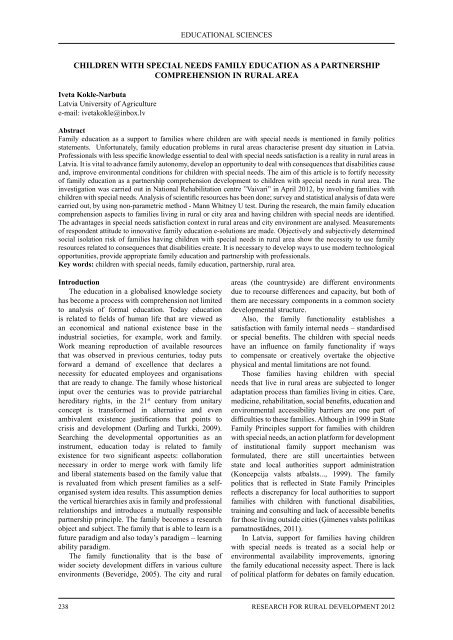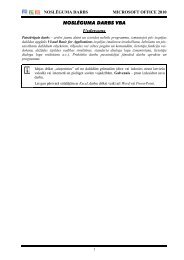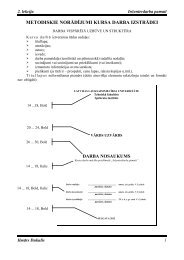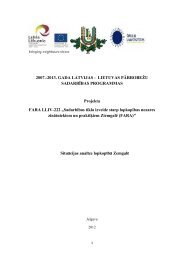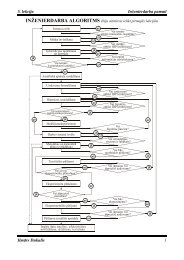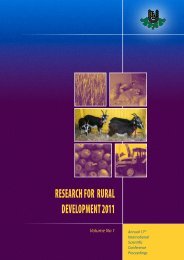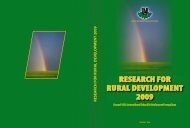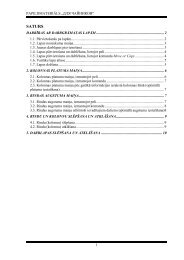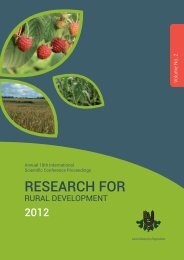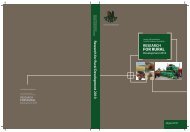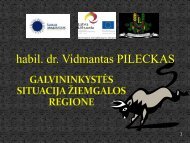LATVIA UNIVERSITY OF AGRICULTURE - Latvijas ...
LATVIA UNIVERSITY OF AGRICULTURE - Latvijas ...
LATVIA UNIVERSITY OF AGRICULTURE - Latvijas ...
- No tags were found...
Create successful ePaper yourself
Turn your PDF publications into a flip-book with our unique Google optimized e-Paper software.
EDUCATIONAL SCIENCESCHILDREN WITH SPECIAL NEEDS FAMILY EDUCATION AS A PARTNERSHIPCOMPREHENSION IN RURAL AREAIveta Kokle-NarbutaLatvia University of Agriculturee-mail: ivetakokle@inbox.lvAbstractFamily education as a support to families where children are with special needs is mentioned in family politicsstatements. Unfortunately, family education problems in rural areas characterise present day situation in Latvia.Professionals with less specific knowledge essential to deal with special needs satisfaction is a reality in rural areas inLatvia. It is vital to advance family autonomy, develop an opportunity to deal with consequences that disabilities causeand, improve environmental conditions for children with special needs. The aim of this article is to fortify necessityof family education as a partnership comprehension development to children with special needs in rural area. Theinvestigation was carried out in National Rehabilitation centre ”Vaivari” in April 2012, by involving families withchildren with special needs. Analysis of scientific resources has been done; survey and statistical analysis of data werecarried out, by using non-parametric method - Mann Whitney U test. During the research, the main family educationcomprehension aspects to families living in rural or city area and having children with special needs are identified.The advantages in special needs satisfaction context in rural areas and city environment are analysed. Measurementsof respondent attitude to innovative family education e-solutions are made. Objectively and subjectively determinedsocial isolation risk of families having children with special needs in rural area show the necessity to use familyresources related to consequences that disabilities create. It is necessary to develop ways to use modern technologicalopportunities, provide appropriate family education and partnership with professionals.Key words: children with special needs, family education, partnership, rural area.IntroductionThe education in a globalised knowledge societyhas become a process with comprehension not limitedto analysis of formal education. Today educationis related to fields of human life that are viewed asan economical and national existence base in theindustrial societies, for example, work and family.Work meaning reproduction of available resourcesthat was observed in previous centuries, today putsforward a demand of excellence that declares anecessity for educated employees and organisationsthat are ready to change. The family whose historicalinput over the centuries was to provide patriarchalhereditary rights, in the 21 st century from unitaryconcept is transformed in alternative and evenambivalent existence justifications that points tocrisis and development (Darling and Turkki, 2009).Searching the developmental opportunities as aninstrument, education today is related to familyexistence for two significant aspects: collaborationnecessary in order to merge work with family lifeand liberal statements based on the family value thatis revaluated from which present families as a selforganisedsystem idea results. This assumption deniesthe vertical hierarchies axis in family and professionalrelationships and introduces a mutually responsiblepartnership principle. The family becomes a researchobject and subject. The family that is able to learn is afuture paradigm and also today’s paradigm – learningability paradigm.The family functionality that is the base ofwider society development differs in various cultureenvironments (Beveridge, 2005). The city and ruralareas (the countryside) are different environmentsdue to recourse differences and capacity, but both ofthem are necessary components in a common societydevelopmental structure.Also, the family functionality establishes asatisfaction with family internal needs – standardisedor special benefits. The children with special needshave an influence on family functionality if waysto compensate or creatively overtake the objectivephysical and mental limitations are not found.Those families having children with specialneeds that live in rural areas are subjected to longeradaptation process than families living in cities. Care,medicine, rehabilitation, social benefits, education andenvironmental accessibility barriers are one part ofdifficulties to these families. Although in 1999 in StateFamily Principles support for families with childrenwith special needs, an action platform for developmentof institutional family support mechanism wasformulated, there are still uncertainties betweenstate and local authorities support administration(Koncepcija valsts atbalsts..., 1999). The familypolitics that is reflected in State Family Principlesreflects a discrepancy for local authorities to supportfamilies with children with functional disabilities,training and consulting and lack of accessible benefitsfor those living outside cities (Ģimenes valsts politikaspamatnostādnes, 2011).In Latvia, support for families having childrenwith special needs is treated as a social help orenvironmental availability improvements, ignoringthe family educational necessity aspect. There is lackof political platform for debates on family education.238 Research for Rural Development 2012


